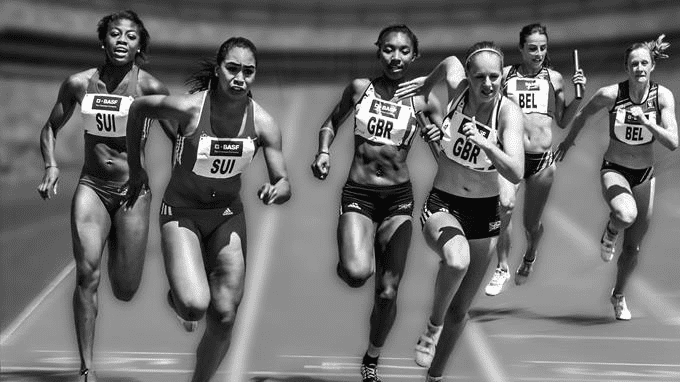THE MOST IMPORTANT QUALITY OF AN ATHLETE
Copyright 2020
By Phil Wright, Jr., B.A., J.D., CSCS, Track and Field Coach for Athletix UltraSM, USATF Certified Level 1 and Level 2 Coach, Certified Strength and Conditioning Specialist
An athlete’s most important quality is the athlete’s psychological foundation. An athlete’s psychological foundation consists of the athlete’s psychological attributes that empower the athlete to manage the psychological challenges of competitive participation in sports. Most of an athlete’s success depends on how well the athlete manages those psychological challenges. Regardless of the athlete’s physical ability, the athlete must first be able to master the psychological challenges of preparation and competition before the athlete can produce successful physical performance. For example, an athlete with impressive physical talent will struggle to succeed if the athlete lacks confidence and is unable to manage anxiety. Similarly, an athlete who lacks motivation will struggle to produce the athlete’s best performance. Effective sports psychology is among multiple factors related to coaching successful athletes, young and old alike. Like training and nutrition, sports psychology is an essential element to an athlete’s success.
Coaches should emphasize components of sports psychology in youth athletes to give athletes an early opportunity to develop a strong psychological foundation. This can be achieved by developing and enhancing confidence and motivation in youth athletes, and teaching them to master the psychological challenges of competitive participation. Participation in youth sports has become a widespread phenomenon in United States society. With the increase of youth athletes and youth sports programs, emphasis on components of sports psychology in the context of youth sports has become increasingly important.
Confidence and motivation are two crucial components of an athlete’s psychological foundation and contribute to the athlete’s success. In order to achieve success, an athlete must believe that the athlete can perform the required task. Confidence gives an athlete that belief and empowers the athlete to manage anxiety. Similarly, an athlete must have adequate motivation to produce the best performance. Motivation is what inspires the athlete to perform. Without motivation, the athlete is not inspired to give the best effort. Absent sufficient confidence and motivation, an athlete will likely struggle to succeed. Accordingly, coaches should prioritize enhancement of their athletes’ confidence and motivation.
Goal setting is a basic, but very effective method for enhancing confidence and motivation in youth athletes. Confidence and motivation have a close connection in the context of sports. As an athlete achieves goals, the athlete gains more confidence. Similarly, an athlete is more likely to be motivated if the athlete is confident.
Understanding the importance of goal setting, coaches and athletes should understand how to effectively set goals to enhance confidence and motivation, and ultimately success. In setting goals for athletes, Stephen Walker, PhD, author of The Effect Sports Psychology Has On A Young Athlete, suggests specifying how much improvement is desired, and how to measure the improvement. For example, for a young track and field athlete, establish a specific distance in the long jump to achieve, or exceed, for the next track meet or for the current season. The improvement would be measured by the difference between the achieved goal distance and the previous distance. Walker also suggests setting goals that are challenging but attainable, and setting multiple goals to increase probability of attainment. Ultimately, setting multiple goals that the athlete can attain enhances the athlete’s likelihood of reaching at least some goals. Reaching each goal is a form of success in and of itself, which likely enhances the athlete’s confidence and motivation, and ultimately success.
Other methods that a coach can use to enhance confidence and motivation in an athlete include informing and reminding the athlete that the coach has confidence in the athlete. Confidence can be contagious. Athletes look to their coaches for direction and guidance in many aspects of sports and competition. In healthy coach-athlete relationships, the athlete typically perceives the coach as an expert and trusts the coach. Accordingly, coaches can have a strong influence on their athletes. Because of the expertise and trust in the coach, the athlete is likely to develop confidence if the athlete believes that the coach has confidence in him or her. Additionally, a coach’s expression of confidence in the athlete is likely to motivate the athlete to perform well in an effort to validate the coach’s confidence.
A confident athlete is typically a motivated athlete. Confidence and motivation are crucial to an athlete’s psychological foundation, which is essential in achieving success, and the athlete’s most important quality. As previously stated, coaches should emphasize components of sports psychology in youth athletes to give athletes an early opportunity to develop a strong psychological foundation. By developing a strong psychological foundation, athletes can learn to master the psychological challenges of competitive participation in sports and increase their likelihood of success. Be confident, Be competitive, Be clutch!
REFERENCE SOURCES:
The Effect Sports Psychology Has On A Young Athlete, Stephen Walker, PhD, Podium Sports Journal, www.podiumsportsjournal.com, April 18, 2008.
This article is a derivative work from Sports Psychology: Confidence And Motivation For Successful Youth Athletes, Phil Wright, Jr., B.A., J.D., CSCS, Team Ohio Newsletter, Volume 2, Issue 1 (The author of this article owns the copyright).
How useful was this post?
Click on a star to rate it!
Average rating 4.7 / 5. Vote count: 15
No votes so far! Be the first to rate this post.





One Response
These things mentioned in thos article are a crucial part of being successful in sports and business. I’m glad that the importance and impact on psychological stability or management and goals was covered because no matter how physically talented one might be, it will likely not be maximized without the most important quality of an athlete.